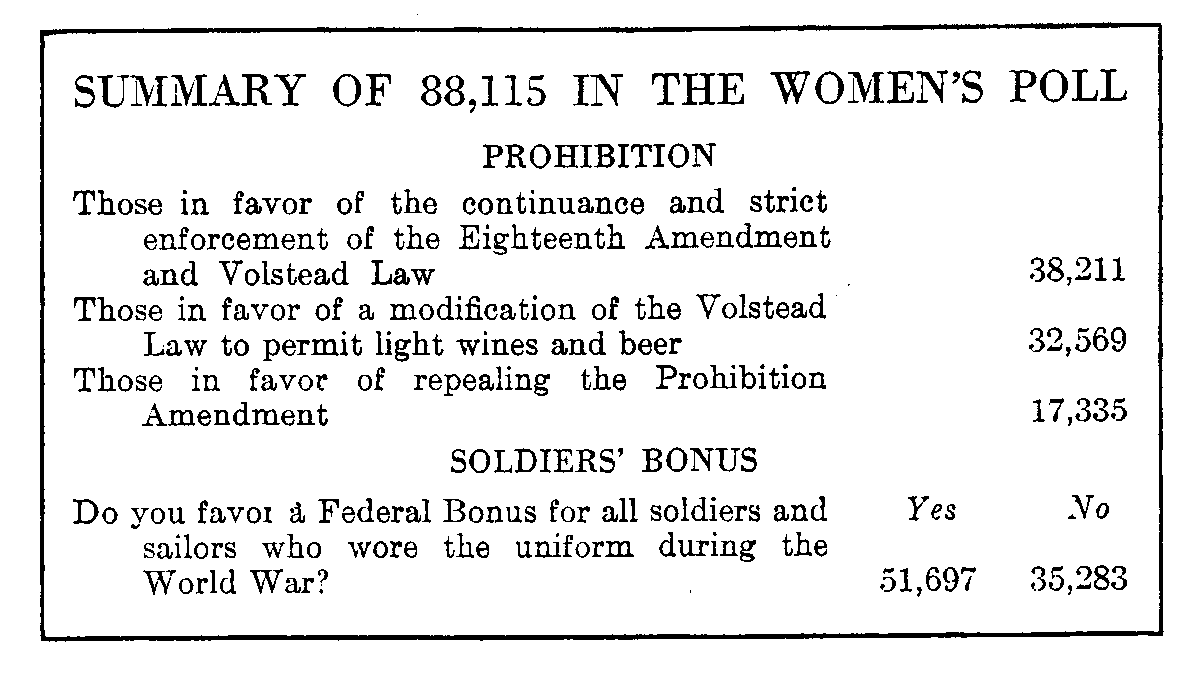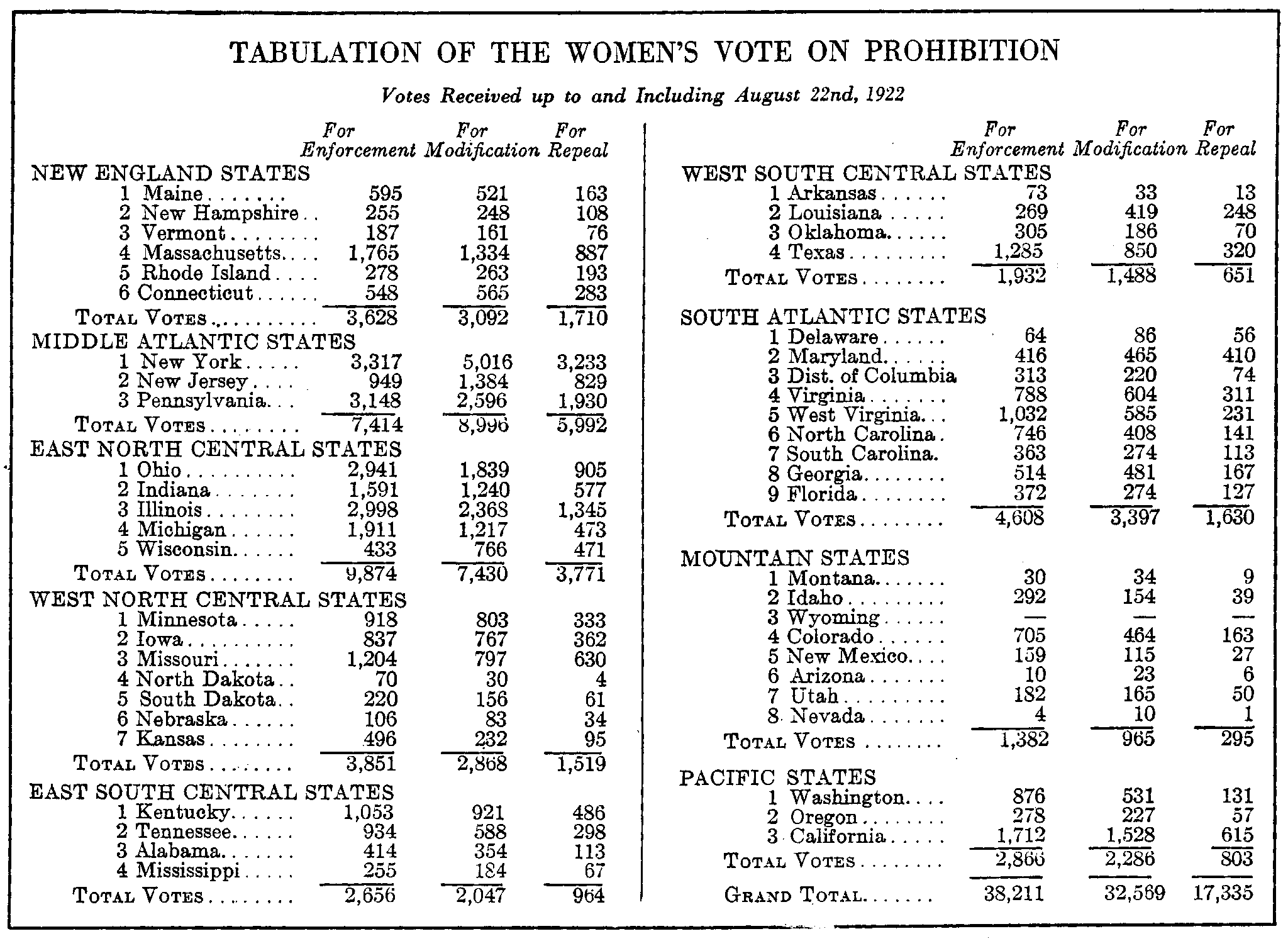Women Vote "Drier" in the Digest's Poll
Literary Digest
DECREASING HUMIDITY, AMOUNTING to nearly 10 per cent. in the past two weeks, is the outstanding feature in the growth of THE DIGEST's special poll of 2,200,000 women of the nation, with which it is supplementing the results of its main poll on Prohibition and the soldiers' bonus. The first published report gave a percentage of 65 against "bone-dryness," a higher percentage than is showy by the main poll, which is founded on the telephone books of the country, and thus contains a preponderance of men voters. The present tabulation shows 55.5 per cent. opposed, to 44.5 per cent. in favor of the continuance of the "dry" laws, and their strict enforcement. This rapid shift of the women's vote toward "dryness" will be almost as surprizing to many publicists of the country as was the "wetness" of the early vote. The first showing of 65 per cent. moisture was called "the one real surprize of the poll" by several editors of "dampish" tendencies, and it was freely predicted that later returns would change the percentages very little. In the case of the men's poll, it was re-called, the first votes came largely from Eastern metropolitan districts, the same which produced the "wet "showing in the first tabulation of the women's vote, but the editors who predicted that the vote from other sections of the country would dry up the "wet" sentiment thus revealed by the main poll, were disappointed. The conclusion seems to be that the men of the country are of a comparatively even "dampness," while the attitude of the women is more sectional.
 Only one part of the country, it will be noticed by consultation of the
detailed summary of the women's ballots on the following page, returned a larger
vote for modification., leaving the "re-peal " vote out of consideration, than
for enforcement. This section, the Middle Atlantic States, including New York,
New Jersey and Pennsylvania, gives a majority for modification only in the two
well-known strongholds of anti-Prohibition sentiment, New York and New Jersey.
Maryland and Louisiana also show a majority for straight modification. On the
other hand, in no less than seventeen of the States tabulated herewith the vote
for continuance and strict enforcement of the present laws is larger than the
combined vote shown in the other two columns. It is notable, also, that parts of
the country so far not well represented in the poll are predominantly "dry." The
next tabulation of the vote, on the basis of the returns shown here, may be
expected to reveal a further loss in humidity.
Only one part of the country, it will be noticed by consultation of the
detailed summary of the women's ballots on the following page, returned a larger
vote for modification., leaving the "re-peal " vote out of consideration, than
for enforcement. This section, the Middle Atlantic States, including New York,
New Jersey and Pennsylvania, gives a majority for modification only in the two
well-known strongholds of anti-Prohibition sentiment, New York and New Jersey.
Maryland and Louisiana also show a majority for straight modification. On the
other hand, in no less than seventeen of the States tabulated herewith the vote
for continuance and strict enforcement of the present laws is larger than the
combined vote shown in the other two columns. It is notable, also, that parts of
the country so far not well represented in the poll are predominantly "dry." The
next tabulation of the vote, on the basis of the returns shown here, may be
expected to reveal a further loss in humidity.
In the meantime a small number of Prohibition organs continue to attack the poll with much enthusiasm. "The whole thing look exceedingly suspicious, as one of the most subtle, clever an dangerous pieces of liquor propaganda," concludes the Indian editor of The American Issue, an Anti-Saloon League organ. This paper presents it as a count against the poll that "at a meeting of the Central Union of the W. C. T. U. in Indianapolis the other day we asked how many of the women present had received a copy of the ballot and 8 out of 32 had received the ballot." The editor does not, for some reason draw the obvious conclusion that, since only approximately 1 out of 6 persons throughout the country can receive THE DIGEST's ballot, considering population and the number of ballots distributed, the W. C. T. U. women of Indianapolis, 1 in 4 o whom received ballots, were well represented. At another meeting the editor says, among 66 voters 16 had received ballots—or almost 1 in every 4—and 5 had rote them. Considering the fact that 10 per cent, is a very good return on polls of this kind, the 5 out of 16 who voted represents an even higher proportion than does the 16 out of 66 who received the bal-lots. These incidents are q–_6'—because they are going the rounds of the "ultra-dry" press, and are illustrative of a class of widely circulated arguments against the validity of the poll. The Indiana Edition of The American Issue, which presents the arguments quoted, also quotes the preposterous charge of "The Advocate (Labor Journal) " that, in the large cities, "whisky men and brewery workers are now hard at work distributing cards from THE LITERARY DIGEST."

This extreme variety of opinion is answered, in good part, by a number of Prohibitionist and religions editors, who believe, in the words of The Christian Century (Chicago), that "an admirable service is being rendered by THE LITERARY DIGEST in securing a wide-spread and apparently representative vote, on questions of live interest to the country."
Publicists not of the "dry" persuasion, while equally ready to accept the authenticity of THE DIGEST's figures, naturally draw quite different conclusions from them. Thus the San Mateo (Calif.) Leader, after some animadversions on the well-organized "drys," observes:
"The New York World says that THE DIGEST vote indicates that the country is going `wet' unofficially—practically we know that it is still. almost as `wet' as ever. There is less beer and wine but more `booze' or hard liquor, and most of it is of the vilest quality.
"Enforcement is more or less a farce performed in spasms. The law should be respected, but there
( 14)
 2
2
would be more respect for it if it were more in conformity with the wishes of the majority of the people."
The Baltimore American quotes from The Continent (Chicago), a Presbyterian publication, to the effect that THE DIGEST's poll "unmistakably indicates the need for more intelligent Prohibition teaching," and that "if the apparently adverse drift of the straw election wakes up Prohibition leaders to get to work again on cultivating and reviving public sentiment it will be a great boost to the 'thy' cause." The American comments:
"The Continent, evidently, is very nervous over the indisposition of the converted to stay converted. It has a right to be, assuming, of course, that a real majority ever wanted Volsteadism in the first place. The trend is all against the Prohibition extremists, and it is getting stronger every minute. Does The Continent want to know why?
"The reason the people at large are flocking into the anti-Prohibition camp is not that the `wet' propaganda is deluding them. It is that they resent the interpretation put upon their reasonably sober desires by those very same `Prohibition leaders' whom The Continent hopes will return to their old exhortations.
"What The Continent and other publications in sympathy with and having the ear of the `Prohibition leaders' ought to do is to read the riot act to those `Prohibition leaders' and make them adopt an attitude that has sense in it and will mollify the country.
"Otherwise, if The Continent and the `Prohibition leaders' don't look out, the time will get here before they know it when opposition to Prohibition will have grown so powerful that a moderate program will be refused by anti-Prohibitionists and the fat will be in the fire in much larger quantities than in the old saloon days.
"No sincere, sound and reasonable-minded newspaper, such as the American esteems itself to be, wants a return of the old conditions, which everybody except those who profited in money by them admit were bad."
A similar conclusion is reached by George McAdam, in the New York Times. He observes that in a nation supposedly " dry "it is amazing that " the most wide-spread political issue should be whether the national bung is to remain tight-driven." He adds:
"To any one who watched the hysteria that almost overnight swept the nation into Prohibition, who remembers that many of the newspapers and magazines would publish nothing on the question but articles showing the beneficent effects of Prohibition, the harmful effects, mental, moral and physical, of even the mildest alcoholic drinks—to any one who watched and remembers all this, there is nothing more significant of the changed attitude of the public mind than the statement of THE LITERARY DIGEST (a publication of pronounced Prohibition antecedents) that `the status of the Prohibition amendment' is one of the `two most pressing problems of the day,' and the statement of McCall's Magazine (a publication for women, making its editorial appeal to the Middle West) that the question, `Are we right about Prohibition?' is `one of the vital topics of the day."'
The Seattle Argus observes that, "One feature of the poll which is amusing is the vote of the State of Maine—nearly two to one against the present `bone-dry' condition. Maine, the original Prohibition State, has been kept `dry' for years by money poured in at every campaign, where a vote was taken on the Prohibition question, by Boston liquor interests. The so-called Prohibition law was loosely drawn and more loosely enforced. And now when the people of the State run up against the real thing, the shoe pinches." The Grand Rapids (Michigan) Chronicle concludes similarly, and more broadly, that:
"The old saying about the shoe pinching and the fellow hollering who happens to have it on holds pretty well in this instance. The people put the country on the `dry' list, but the people didn't know what they were in for. Now there is a general swinging backward of the pendulum and the 'moist' sentiment is coming to the front. There are many good citizens who would rather see the country openly 'slightly wet' than secretly `very wet,' as all who are well informed know it is to-day."